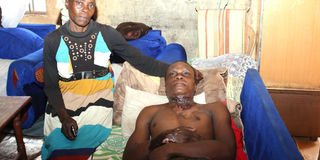He stepped on a live electric wire and now he feels trapped, angry

Petronilla Muchele with her son Isaac Matati at their home in Uthiru. Isaac was electrocuted when he stepped on a power cable last year.
What you need to know:
- 24 per cent of deaths from electrocution are due to faulty wiring.
- 16 per cent are due to illegal connections
- 12 per cent are due to structures and buildings near power lines
Petronilla Muchele is dejected. Her face is buried in her hands. She is seated at the bedside of her only son, Isaac Matati.
Her crestfallen eyes tell it all as the Uthiru resident starts narrating how her son was electrocuted one Thursday morning last October.
"I only found out a day after the incident when a family friend in Westlands called me to inform me that my son had stepped on a live power cable and was taken to Kenyatta National Hospital," the mother of four recounts as tears uncontrollably roll down her face.
Isaac, who for seven weeks could not turn in bed, has now been discharged from hospital but struggles to sit, and is forced to spend all day in bed.
He can now remember what happened before the incident, and murmurs to us that he was about to cross to the other side of Chiromo Road after a downpour, when he stepped on a live electric wire.
"When I recovered consciousness I was in hospital, unable to speak or turn. My mother has had to take care of me all this time," mumbles the once-ambitious 31-year-old man who was aspiring to invest in clothing and public transport.
Unable to swallow food
Petronilla says Isaac's situation is psychologically draining her as she wonders when her son will walk again. She blames Kenya Power for laying its high voltage power cables recklessly.
"Even after we reported the matter, they have never come to see my son. Financially, we have exhausted the family kitty," sobs the 56-year-old trader at Uthiru market.
Medical receipts show that Petronilla has spent more than Sh400,000, and is yet to clear a bill amounting to Sh2 million at the hospital.
Isaac says the electrocution seems to have changed him completely. He fears being left alone.
His legs are burnt up to the thigh region, his neck and throat remain stiff, he was unable to swallow food in the first days, leaving him emaciated.
His face was deformed and can only be recognised by family members and friends, in what he says has held back his life.
Medical reports from Kenyatta National Hospital indicate that Isaac developed paralysis after the electrocution and has since had challenges in passing urine and stool. "My strength is depleted but I still have to work every day to make ends meet," she says, disclosing her profit of Sh300 daily is barely enough to take care of her son.
Thousands of cases like Isaac’s lie in court, with Kenyans suing Kenya Power for incidents of electrocution of people and livestock, sometimes resulting in death.
Faulty wiring
Kenya Power chief executive Bernard Ngugi has in the past said the company is addressing the worrying trend of public electrocutions. He said they were carrying out safety campaigns to educate the public on the danger of unsafe use of electricity.
"We have a legal and moral obligation to protect lives and we always aim to operate in a safe environment," he said.
However, people are still being killed by the company's dangerous power cabling, with faulty wiring being the leading cause of electrocutions at 24 per cent, illegal connections at 16 per cent, structures and buildings near power lines at 12 per cent and deliberate acts at nine per cent, according to data it released last year.
Six fatal accidents are reported every month in Kenya, with more than 32 per cent of these occurring in homes due to poor wiring and illegal connections.
The study also indicates that the 10 leading counties in cases of electrocution are Nakuru, Nairobi, Kericho, Uasin Gishu, Siaya, Busia, Nyamira, Meru, Kirinyaga and Kiambu.
But what is more concerning is that Petronilla and her son are gradually sinking into depression, which further confines the family into more financial distress.
At her vegetable stall, Petronilla is dispirited and lacks her usual vigour and excitement when serving her customers. "I am always thinking about one thing. My son. Day and night. I don't sleep," she tells HealthyNation.
She has lost interest in her usual activities, no longer enjoys food and drinks as before as she keeps wondering when the nightmare will end.
Isaac, who has now settled to the reality that he may only get back to his normal life after two years, is graced by a sense of hopelessness and irritability, as his friends' lives continue normally while he remains in solitary confinement.
"My life is on stand still. I am angry because I cannot change my situation. I have lost count of the days I spend alone," he burbles.
According to psychiatrist Lukoye Atwoli, social factors play a role in mental illness, involving aspects of personality and coping mechanisms, as well as how episodes of illnesses are dealt with, and the state of the environment of the victim.
"There is what is considered socially acceptable behaviour, and quality of interpersonal relationships are important social factors that can contribute to one's state of mind," he says.
Mood disorders
An unfortunate sudden change of normal life activities could greatly influence how you think about the environment around you.
According to Science Daily, psychiatric disorders such as psychosis, mania, depression, post-traumatic stress disorder, conversion disorder, adjustment disorders and schizophrenia have been reported as diseases triggered by electrical injuries.
"However, the onset of symptoms sometimes occurs for days to years after an electrical injury, including changes in behaviour and difficulties with verbal memory and attention, irritability, frustration, aggressive behaviour and psychotic disorders," it reveals.
It adds that an electric shock ranging from 120 to 52,000 volts can cause neurologic and neuropsychological symptoms in humans. Following an electrical injury, some patients may show various emotional and behavioural aftereffects, such as memory loss and symptoms of depression.
"Increased mood swings have been observed after an electrical injury to a person without previous mood disorders and personality, and this is attributable to circulatory hormone changes that occur in the hippocampus,” adds the report.
Hippocampus is a complex brain structure embedded deep into the temporal lobe, and plays a major role in learning and memory. It is vulnerable to damage by a variety of stimuli.
The World Health Organization states that mental health is one of the most neglected areas of public health, with close to one billion people living with the condition in the world.




